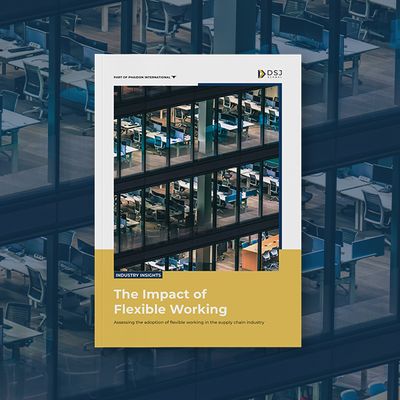supply-chain
Energy crisis along the value chain – Four companies on the road to sustainability
DSJ Global discovered how four companies are saving energy and reducing emissionsRising prices, persistent inflation – what affects private households burdens the supply chain industry to an even greater extent. While energy-saving measures used to be simply related to a company's own Health, Safety, Environment (HSE) and sustainability strategy to reduce its carbon footprint, they are now part of essential processes that could secure long-term cost savings and eco-optimize a company’s future.But what can be done along the supply chain to keep control over rising energy costs? How can firms reduce their carbon footprint to both cut emissions and minimize consumption? Yumiko Moehlmann, Head of Quality & HSE at DSJ Global, asked. Reducing the carbon footprint as a business When asked, "What is your company doing to become more sustainable and save energy?" 51% of participants responded with a clear "reduce carbon footprint." 20% of companies are sourcing more sustainable raw materials for their production while 16% are switching to energy-saving solutions for lighting. 12% also said they are raising awareness among their employees through education and training. To gain further insights, Yumiko Moehlmann personally surveyed her network in the Quality and HSE area on the topic, talking to four companies along the supply chain to provide insights into how their companies are defying rising energy prices - or not. Energy targets firmly anchored in corporate cultureCOO at a global player in the e-mobility sectorThe e-mobility sector is considered a pioneer in sustainability. A global player and client of DSJ Global also pursues this mission at the level of corporate culture. They have clearly defined environmental and energy goals and woven them into their corporate strategy. "We raise awareness on the topic of energy," explains the COO. By visualizing the costs and energy consumption of equipment and production, their company create awareness among employees, who can adjust and optimize their actions and processes accordingly. There are also detailed shutdown lists to ensure that sensitive machinery is operated correctly and that all employees are taught the right procedure. This saves resources and protects the equipment. Furthermore, efforts to switch to the most modern and energy-saving machines support the company’s current measures. Although these machines have to meet certain requirements, they are much more efficient and cost-effective to operate.For example, the global player has already converted to a decentralized compressed air network with small local systems that run when they are needed. Previously, they were in continuous operation even though it wasn't necessary. In-house gardening as a delicious solutionDirector Global EHS at a tier 1 automotive supplierOne easy-to-implement option for indirectly reducing one's own emissions is to switch to so-called green electricity, i.e. electricity from renewable sources. Electricity from solar, wind or even biogas produces less CO2 during production and is therefore considered better for the environment. Yet upon closer inspection, these promising effects might be lower in reality, according to the Director for Global EHS at a tier 1 automotive supplier. This long-time customer of DSJ Global has already converted many areas to green energy. However, the Director was skeptical– he saw it as clear "greenwashing." Greenwashing refers to the attempt by organizations to achieve a "green image" through communication, marketing and individual measures without having systematically anchored corresponding measures in the operational business. "Electricity is ultimately the same for everyone," says the Director. The percentage from renewable sources doesn't change the fact of how much energy is consumed, he said. Consequently, a widely advertised switch to green electricity is not effective, since ESG must be primarily about reducing the company's own emissions. For the Director, however, it would be more effective to switch all light sources in operation to resource-saving LEDs. Unfortunately, the biggest problem cannot be solved so easily: According to lifecycle analyses that the automotive supplier initiated for each product, their supply chain leaves the largest carbon footprint. They found that commuting had a particularly heavy impact as well. After two years of pandemic home office regulations, more and more companies are looking to return to the office to strengthen collaboration within departments and teams. As the Director explains, his company is currently looking for a solution to make this more sustainable. Some employees have no other choice than their car, but for others, covering the cost for public transportation or even leasing a bike is an option. In addition, smaller on-site office spaces could help reduce emissions if a location has a larger catchment area with longer commutes.In other areas, there's room for more creativity: some locations of the automotive supplier, the director said, have established in-house gardens to more sustainably source the fresh fruits and vegetables provided to employees each day. "In the past, fruits and vegetables were delivered daily," the Director explains. "Inhouse gardening stops the supply chain and their vans, saving tons of CO2, and the company cafeterias use the homegrown fruits and vegetables instead."The initiative has been so well received that entire teams are now getting personally involved. In the "Lunch & Learn" format, employees educate themselves via open lectures on a variety of topics while enjoying a company-funded lunch.Global Sustainability Manager defies initial pessimismHead of Health, Safety, Environment, Sustainability, Quality, at a global player in the chemical industryThere is less optimism at a company in the CHEMPARK network. The head of HSSEQ sees very little potential – apart from putting a stop to production – for saving energy.Reducing commuting and the associated emissions as well as the energy required through more flexible home office solutions is only possible to a limited extent in the case of this company, he says. But the company does not want to give up. It has recently hired a Global Sustainability Manager and hopes for sustainable change, even if any structures have to develop before they take effect and lead to savings. Photovoltaics as an alternative to costly investmentsSenior Manager Mineralization at a building materials manufacturerThe possibility of saving energy in cement production is a question that also occupies the senior manager for mineralization of a building materials manufacturer. In fact, the only way to do this, the senior manager says, is to stop production or shut it down – neither of which are economically viable options, of course.Since the manufacturer buys its electricity on the stock exchange, it’s possible to obtain it more cheaply, yet that depends on the production processes. They need to be optimized to allow for a more cost-effective tariff. Another option is to invest in more energy-efficient plants. "Some of our equipment is 60 or 70 years old," the senior manager says. "New machines are inevitably more energy efficient, but realistically we can't replace all the machines because the cost would be far too high."How his company nevertheless tries to counteract the enormous costs and has been reducing the overall need for externally produced energy for years. Their method of choice: photovoltaic systems on the factory roofs. This is already proving effective: The resulting savings could light up an entire small town. Heat recovery as the vision of the futureSenior EHS Manager at a global semiconductor companySince they are renting in their current location, this global semiconductor company has little room to maneuver. "We're turning down the heat, relying on home offices and reduced hours," explains DSJ Global's client. Long-term goals are few and far between since, as a tenant, they can't seek extensive renovations. Still, there are innovative ideas: Since the production machines give off a lot of heat, the Senior EHS Manager and his team are working on using this to generate electricity via heat recovery.Funding for production conversion in sightAs difficult as cost savings and emissions reductions are: A competitive, climate-friendly industry is essential for sustainable growth and the fight against climate change. At the beginning of December 2022, Germany’s Economics Minister Robert Habeck announced climate protection agreements that he would conclude with industry in 2023 to stimulate necessary investments in the use of hydrogen. This is the best alternative to fossil energy sources, especially in the steel and chemical industries. Under the climate protection agreements, companies receive both subsidies and monetary support if they convert to green production. When and to what extent these funds will come remains to be seen. Until then, it's up to innovative ideas like indoor gardens and company-owned photovoltaic systems to make the value chain more sustainable. ConclusionOpinions on how to save energy along the value chain vary widely, Yumiko Moehlmann confirms. "Many companies don't want to or can't change anything, or position themselves better. Others invest a lot in it." She sees the promised climate agreements as a positive sign. After all, as some of the examples cited show, companies especially need help with the enormous costs of switching to greener production. Yumiko and her team of experts at DSJ Global are closely following how the energy crisis is affecting HSE and sustainability strategies and how different companies are adapting. Whether the companies that are not currently planning any changes will aim for more sustainable production in the future remains cause for speculation.Your partner for sustainable niche professionalsIn addition to HSE talents, our global network continues to grow in the area of Corporate Social Responsibility (CSR) and Sustainability.Reach out to our talent experts today, to discuss us supporting you with a vacancy, or as a professional keen to make their next career move. Submit a vacancySend CVContactYumiko MoehlmannHead of Quality & HSE, DSJ Globalyumiko.moehlmann@dsjglobal.com+49 30 726211418
Read More



















